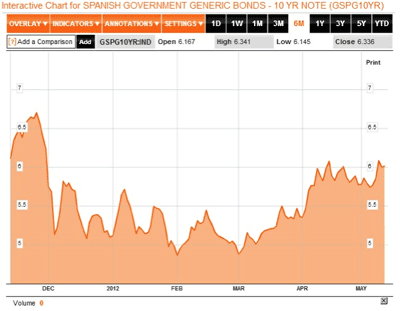Greece was one thing, even if it exits the Eurozone. But Spain is a much bigger problem, and unfortunately, that's where the problem begins, not ends, warns John Mauldin of Thoughts from the Frontline.
I have been writing for almost two years about the fact that the cajas, or Spanish regional banks, are worse than bankrupt.
US banks are shut down when their nonperforming loans are at 5% of their capital. Spanish banks are at 20% and rising rapidly. My coauthor Jonathan Tepper and I spent a whole chapter in Endgame on Spain, at the end of 2010.
Last week, the Spanish government basically nationalized Bankia, the nation's fourth largest bank, which had been cobbled together from seven failed cajas and given a large government guarantee and a €3 billion public-offering equity infusion. Only roughly half of its real-estate loans are generating returns, and that is the number for public consumption.
<blockquote>
"Aside from creating a financially unsound bank, the government also demanded an additional €30 billion worth of write-downs on loans—valuing €84 billion in total, when combined with the original requirement of €54 billion in write-downs. The combined write-down program is, however, unlikely to be sufficient to address the close to €180 billion in toxic assets held by Spanish banks.
"Furthermore, many of Spain's struggling banks will be unable to maintain the core tier-one capital ratio required by EU regulations without the government's assistance. Spanish banks will require an estimated €100 billion to €250 billion in recapitalization later this year to reach this capital ratio target—a significant percentage of which will have to be shouldered by Madrid.
"The government takeover of Bankia is a clear policy reversal for the conservative administration of Prime Minister Mariano Rajoy, who for months insisted that no additional public funds were needed for the banks. Intervening on Bankia's behalf demonstrates the failure of Spain's banking consolidation strategy." (Stratfor)
</blockquote>
We are talking the need for new Spanish-government debt amounting to roughly 25% of GDP that will be needed just this year, and that's if things don't deteriorate beyond present assumptions in their real-estate sector.
Care to make a wager on how sound those assumptions are? About as sound as Rajoy's assessment, only a few months ago, that no public money would be needed, perhaps?
Let's do some basic math. Spanish banks took down some €352 billion in the LTRO (created by the ECB), or over a third of the total amount. They have about €80 billion left after deposit outflows and buying sovereign debt. Which will be needed to buy yet more Spanish government debt, so they can be bailed out.
As near as I can tell, Spain is guaranteeing about $20 billion of the new IMF funds that will be used for a European bailout. Spain already has $332 billion of liabilities to the ECB, $125 billion to the stabilization fund, another $99 billion for something called the Macro Financial Asset Fund, and various guarantees for other bank and European funds, all of which totals over $600 billion, give or take.
Their public debt-to-GDP ratio is only 69%, but add in these other guarantees and commitments and you get over 130% debt-to-GDP. And that is before they start bailing out their banks, and before any additional debt from their fiscal deficit, which is running at 8%.
(Yes, I know they say it will be around 5%; but they are in a deepening recession. Unemployment is rising at an alarmingly high rate, which lowers revenues and increases government spending; and their bond costs are rising. Care to take the over/under bet on, say, a 7% fiscal deficit? You get to be the under. Hmmm, I don't see many hands out there.)
Look at this chart of ten-year Spanish bonds:
Notice that rates came down when the LTRO was issued and Spanish banks had the money to buy Spanish government debt. Why would they buy it? Because they got to borrow money from the ECB at 1% for three years and could make a very fat spread. Making a "free" 4% is a tried and true way to garner profits that can be used to offset losses.
Once the LTRO was done, Spanish interest rates began to climb. Note that they only briefly dipped below 5%.
I think I have this straight. Spain wants to guarantee more bank debt that the banks will use to get more money from the ECB, which will in turn be invested in Spanish bonds that will provide the money to run higher deficits, which will...
This is somewhat like a destitute bar patron guaranteeing his friend's tab so his friend will buy him more drinks. The ECB is the bartender. European taxpayers are the bar owners. We know who pays the tab in the end.
It seems quaint that only a few years ago the concern in Europe was that there would be "contagion" risk resulting from a Greek default. So worried were they that we had almost-daily pronouncements that Greece would not be allowed to default, that there was no need for a Greek default, the developed countries no longer defaulted, etc. Now that Greece has defaulted, the line in the sand is "That was just Greece; no other country will need to default."
But just in case, European leaders created all sorts of funds, guaranteed jointly and severally, to help bail out nations in trouble. First Greece, then Ireland and Portugal. Even with all the money that was raised, it was not enough to prevent a Greek default. And the "new" debt is trading at around 10% of what the original was...as I was predicting two years ago.
The austerity that was forced on Greece has resulted in a backlash from Greek voters. The two ruling parties, basically run by two families, had traded control of the government back and forth for 50 years. Last week they could not even get 33% between them. In fact, no coalition can be cobbled together from any of the splinter parties.
There will now be new elections, probably in June. Looking at the early polls, it is probable that a coalition will form that will reject the enforced austerity. Which will of course mean that Greece will not get the European funds it needs to be able to pay for even the austerity programs. Which will make things worse and hasten the departure of Greece from the euro.
Europe and the euro can survive without Greece. They could even make it without Portugal. Ireland will merely default on the debt it incurred from the ECB to bail out its banks, but will want to stay in the Eurozone.
But the euro needs Spain to maintain a credible standing, or so Germany evidently believes.
Subscribe to Thoughts from the Frontline here...
Related Reading:
Airline All But Cancels Big Airbus Order











